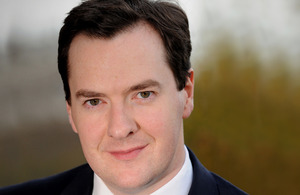What is the Spending Round?
The Spending Round 2013 will set out how the government will spend £740 billion pounds of tax-payers' money between April 2015 and April 2016.

Chancellor George Osborne will announce the results of the Spending Round on June 26
The Spending Round is a Whitehall-led process to allocate resources across all government departments, according to the government’s priorities.
Spending Reviews set departmental budgets for current and capital spending over several years. It is then up to departments to decide how best to manage and distribute this spending within their areas of responsibility.
This Spending Round is very similar to a Spending Review, but allocates spending for just one year rather than for multiple years. Spending Round 2013 will set departmental budgets for the financial year 2015 to 2016.
The Chancellor will announce the results of the Spending Round on 26 June 2013.
In the Spending Round, the government will set out how it will make £11.5 billion of savings from current spending and how it will allocate capital spending in 2015 to 2016. Capital spending plans have been increased by £3 billion from 2015 to 2016 onwards.
At Budget 2013, the government confirmed the overall level of public spending for 2015 to 2016 (the ‘spending envelope’), divided between current and capital spending. The Spending Round is the process through which this envelope is allocated to departments to pay for all areas of government activity.
At the Budget, the government announced that its themes for the Spending Round would be growth, public service reform including localism, efficiency and fairness. These themes will be reflected in the decisions announced on 26 June.
Decisions on allocations of departmental spending are made collectively by the government. The Cabinet has been supported by a committee of senior Cabinet Ministers, called the Public Expenditure (PEX) Committee. This is sometimes referred to as the Star Chamber.
Throughout the Spending Round process, collective ministerial meetings have been supplemented by discussions between departments and the Treasury.
Find out more about departmental spending in our public sector spending guide.